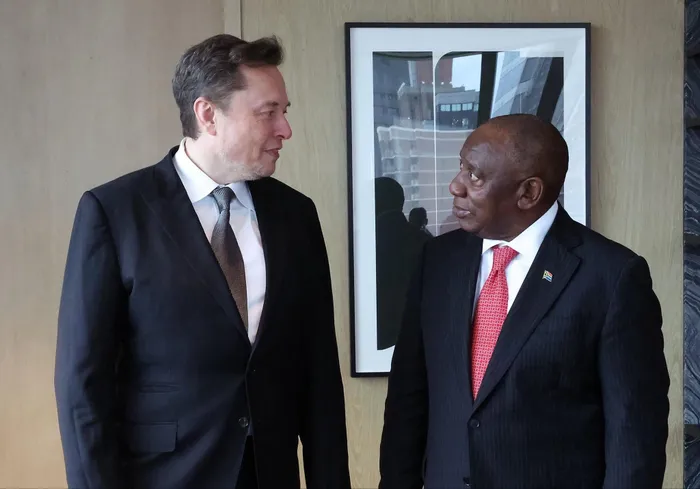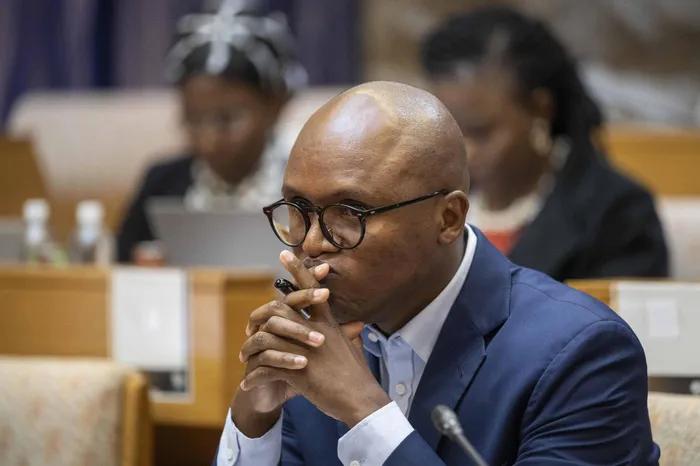Starlink 'Deal' Exposes B-BBEE Ideological Fault Lines
ECONOMIC TRANSFORMATION

President Cyril Ramaphosa met with South African-born tech billionaire Elon Musk on the sidelines of the UN General Assembly in New York on September 24, 2024. Of major concern is the notion that Starlink is the only, or even the best, option for satellite internet is misleading, says the writer.
Image: Presidency
Reneva Fourie
ON MAY 23, Minister of Communications and Digital Technologies, Solly Malatsi, issued a policy directive proposal offering alternatives to broad-based black economic empowerment.
This follows a policy directive to the Independent Communications Authority of South Africa (ICASA) requiring it to investigate whether to open up applications for individual electronic communications network services (ECNS) licences. These announcements coincided with engagements between Presidents Cyril Ramaphosa and Donald Trump during a trip to the United States. A deal with Starlink was publicly advocated in a public session related to the meeting.
Some critics believe that the directives have been introduced specifically to help Starlink enter the market in a way that isn’t completely straightforward. This concern is reasonable. During a meeting with the Portfolio Committee on 27 May, Minister Malatsi discussed the purpose of these new directives but struggled to explain why such major changes are needed. This uncertainty has left many people questioning who will benefit from these directives.
Despite the controversy, it is essential to acknowledge that South Africa does face substantial connectivity challenges, especially in remote and underserved areas. According to ICASA’s 2025 State of the ICT Sector Report, 3G and 4G coverage is nearly universal, with 3G at 99.79% and 4G at 99.07%.
However, broadband quality remains a pressing issue. The report reveals that South Africa ranks 102 out of 154 countries in fixed broadband speed, with average download speeds at 48.51 Mbps and upload speeds at 39.75 Mbps.
Furthermore, only 82.06 per cent of the country has broadband access, mainly driven by terrestrial fixed wireless broadband, highlighting the persistent digital divide, particularly in rural communities. The national broadband strategy, SA Connect, was intended to bridge this gap, but its implementation has faltered, failing to deliver on its promise of accessible, high-quality, and affordable connectivity.
Against this backdrop, satellite internet offers an appealing solution. It has the potential to rapidly extend internet access to rural and hard-to-reach areas without the massive infrastructure investment required for terrestrial networks. It is within this context that many view the entry of operators like Starlink as a potentially valuable development if managed equitably and transparently.
The framework that governs the provision of electronic communications services (ECS) and networks (ECNS) in South Africa is dictated by the Electronic Communications Act (ECA). Under the current regime, new entrants must obtain individual ECS and ECNS licences from ICASA.

Parliament's Portfolio Committee on Communications and Digital Technologies grilled Minister Solly Malatsi on his draft policy directive relating to the Equity Equivalence Investment Programme and applications for licencing in the ICT sector, Cape Town, May 27, 2025.
Image: Armand Hough/Independent Newspapers
However, such licences are not readily available and can only be issued if the Minister of Communications and Technologies issues an Invitation to Apply (ITA). As it stands, the only feasible route is through the acquisition of licences from existing holders, a process both cumbersome and time-consuming.
Compounding this challenge is the ECA’s requirement that licensees must be at least 30% owned by historically disadvantaged individuals or groups. This stipulation is a cornerstone of South Africa’s efforts to address systemic economic inequality and is a critical component of the B-BBEE framework.
The Minister’s policy directive allows for multinationals to make EEIPs as an alternative to direct equity transfer. While this provision aims to uphold the spirit of empowerment, it also introduces a degree of flexibility that, if abused, could undermine the transformative goals of the original policy.
The core concern for many observers is not the inclusion of satellite operators per se, but the apparent preferential treatment of Starlink, a company led by Elon Musk – who has a contentious relationship with South Africa and has been accused of using his international platform to discredit the country. Reports suggest that Musk has lobbied extensively for Starlink to bypass the B-BBEE regulations, advocating for preferential procurement and regulatory exemptions.
In December 2022, Starlink indefinitely paused its plans to launch in the country. Nevertheless, companies that facilitate the import and activation of Starlink’s regional roaming services have brought Starlink kits into the country prompting ICASA to issue a formal notice declaring that using Starlink locally is illegal.
The timing of the directives, shortly after engagements with former President Trump – a Musk ally – has fuelled speculation that the Minister’s policy interventions are politically motivated and tailored to facilitate Starlink’s market entry without due legislative or regulatory process. If true, this would not only set a dangerous precedent but also effectively bypass Parliament, thereby undermining the rule of law and institutional checks and balances.
Another major concern is the potential erosion of South Africa’s regulatory integrity. Licensing under the ECA is a tightly governed process intended to ensure that all market participants are subject to the same rules and standards. In addition, ICASA is refining a Licensing Framework for Satellite Services. By issuing directives that circumvent these established protocols, the Minister risks destabilising the sector and weakening ICASA’s authority.
Of major concern is that the notion that Starlink is the only, or even the best, option for satellite internet is misleading. Alternative providers such as China’s Chang Guang Satellite Technology Company offer more advanced technology with significantly higher transmission speeds. Satellite service providers should be selected based on the best strategic choice for the country.
South Africa needs to proceed with caution as it works through the challenges of expanding its digital services, updating regulations, and managing relationships with other countries. While providing everyone with internet access is important and urgent, the approaches taken must be affordable, reliable, transparent and fair. If South Africa decides to allow satellite companies into the market, it should still follow the laws already in place or make appropriate changes through Parliament.
Additionally, foreign companies should not be allowed to push aside local policies that aim to support economic fairness and social justice. South Africa must stand firm against pressure to make decisions that benefit a small group of people at the cost of the larger community. The country's future in technology relies not just on making sure people can connect but also on fair governance and upholding the law.
* Dr Reneva Fourie is a policy analyst specialising in governance, development and security.
** The views expressed do not necessarily reflect the views of IOL, Independent Media or The African.